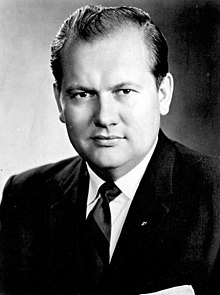William C. Cramer | |
|---|---|
 | |
| Member of the U.S. House of Representatives from Florida | |
| In office January 3, 1955 – January 3, 1971 | |
| Preceded by | Courtney W. Campbell |
| Succeeded by | Bill Young |
| Constituency | 1st district (1955–1963) 12th district (1963–1967) 8th district (1967–1971) |
| Member of the Florida House of Representatives from Pinellas County | |
| In office 1951–1953 | |
| County attorney for Pinellas County | |
| In office 1953–1954 | |
| Personal details | |
| Born | William Cato Cramer August 4, 1922 Denver, Colorado, U.S. |
| Died | October 18, 2003 (aged 81) South Pasadena, Florida, U.S. |
| Resting place | Woodlawn Memory Gardens in St. Petersburg, Florida |
| Political party | Republican (1949-2003) Democratic (before 1949) |
| Spouse(s) | (1) Alice J. Cramer (divorced) (2) Sarah Ellen Bromelow Cramer (married ca. 1992–2003, his death) |
| Children | 3 |
| Residence(s) | St. Petersburg, Florida |
| Alma mater | St. Petersburg Junior College
University of North Carolina at Chapel Hill |
| Profession | Attorney |
William Cato Cramer Sr. (August 4, 1922 – October 18, 2003), was an American attorney and politician, elected in 1954 as a member of the United States House of Representatives from St. Petersburg, Florida. He was the first Florida Republican elected to Congress since 1880, shortly after the end of Reconstruction. He was re-elected, serving without interruption until 1970.
In Congress, Cramer became a ranking member of the Roads subcommittee of the Committee on Public Works, and influenced national highway policy at a time of major expansion, ensuring that Interstates were kept toll-free. He gained extra funding to link Tampa and Miami, in a federal interstate project built in Florida.[1]
He was instrumental in the revival of the Republican Party in Florida through the mid-20th century, taking advantage of the state's changing demographics and new Republican migrants from the Northern United States and the Midwestern United States, and attracting Cuban Americans and other minorities to the party.[2] Beginning in 1964, Cramer represented the state for 20 years on the Republican National Committee and served as its counsel for six years.[2]
The long absence of Republican officials from state office and weakened condition of the party were due to suppression of black and Republican voting in the 19th century, and the disenfranchisement of African Americans at the turn of the century, as they had constituted the majority of the Republican Party. Most were not able to vote for decades. They re-entered the political system by gaining the power to vote after passage of the federal Voting Rights Act of 1965.[3]
- ^ "Justin C. Whitney, "Florida expressways and the public works career of Congressman William C. Cramer," 2008, University of South Florida, posted at Scholar Commons, accessed 11 February 2016".
- ^ a b "Wolfgang Saxon, "William C. Cramer, 81, a Leader of G.O.P. Resurgence in South", October 27, 2003". The New York Times. Retrieved December 26, 2011.
- ^ Cite error: The named reference
valelly146-147was invoked but never defined (see the help page).
© MMXXIII Rich X Search. We shall prevail. All rights reserved. Rich X Search
